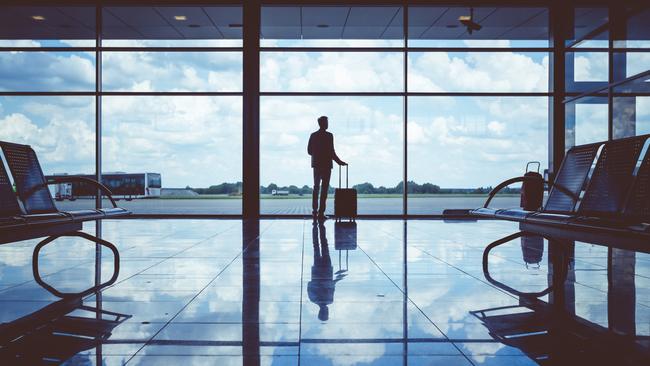Grounded zero: corporate giants ban staff from travelling as epidemic rages
Corporate Australia has had its wings clipped by the unfolding global coronavirus epidemic.

Corporate Australia has been grounded by the unfolding global coronavirus epidemic, with some of the nation’s biggest listed companies banning staff from international travel in a move that will significantly affect how business is conducted in the coming months.
In an attempt to protect workers from the worsening global outbreak, multi-billion-dollar corporates including the big four banks and mining giants have now prohibited staff from travelling to Asia, Europe and in some instances even domestically as the virus takes hold around the world.
As the number of reported cases of COVID-19 approaches 100,000 across six continents and 80 countries, companies are now being forced to rely on various forms of technology to get business done around the world as chief executives seek to maintain revenue and earnings. Acting Westpac chief executive Peter King has effectively grounded his entire workforce, except for travel between Australia and New Zealand, even though the World Health Organisation is yet to declare the virus a pandemic.
Retail giant Woolworths, led by boss Brad Banducci, has told staff to limit all domestic travel until further notice, a directive also issued by real estate company Goodman. Its chief executive, Greg Goodman, has also asked staff to limit travel between European countries, with employees told to avoid planes and trains.
The increasingly strict travel bans on staff across leading companies will have significant ramifications for the revenue of carriers including Qantas and Virgin, as well as their international counterparts like Emirates and Singapore Airlines.
At the Commonwealth Bank, overseas staff trips have been limited to absolutely business-critical travel. Workers are not allowed to transit through Asia and require managerial sign-off on any travel planned for elsewhere in the world.
Virtually all large corporates surveyed by The Australian said they were requiring staff who had visited any countries deemed high risk by the Australian government to self-isolate for two weeks, with many now carrying out their duties from home.
In Australia, 41 cases of the virus have now been identified, including a healthcare worker at an aged care home in Sydney. There has only been one recorded death, Perth local James Kwan.
Staff at the Ross McEwan-led National Australia Bank and at Shayne Elliott’s ANZ are also being forced to gain approval from management before travelling to international destinations.
CBA employees who have visited China for work or personal reasons have been directed to spend 14 days in self-isolation before returning to the office.
Many companies said government advice and travel restrictions are being monitored and immediately implemented at their organisations.
“It’s an evolving situation,” a spokeswoman from NAB said. “The wellbeing and safety and security of our colleagues is front of mind.” On Wednesday night, the Australian government was advising citizens to avoid travelling to China and Iran. A “high degree of caution” was recommended when visiting South Korea, Japan, Italy and Mongolia.
A spokeswoman for healthcare giant CSL said it was “vigilantly monitoring the situation and using available technologies to limit travel”.
Mining companies BHP and Rio Tinto have banned travel to China, while operating on a case-by-case basis with travel to Asia.
BHP said its first priority “remains the safety of our people”.
“We are restricting all non-essential travel in and around China, including for local employees based in China, as a precaution,” a spokesman said.
“We are in close contact with our customers in China to provide support through this period.”



To join the conversation, please log in. Don't have an account? Register
Join the conversation, you are commenting as Logout